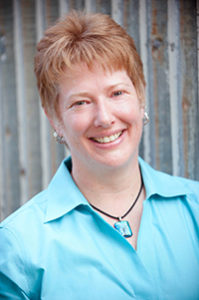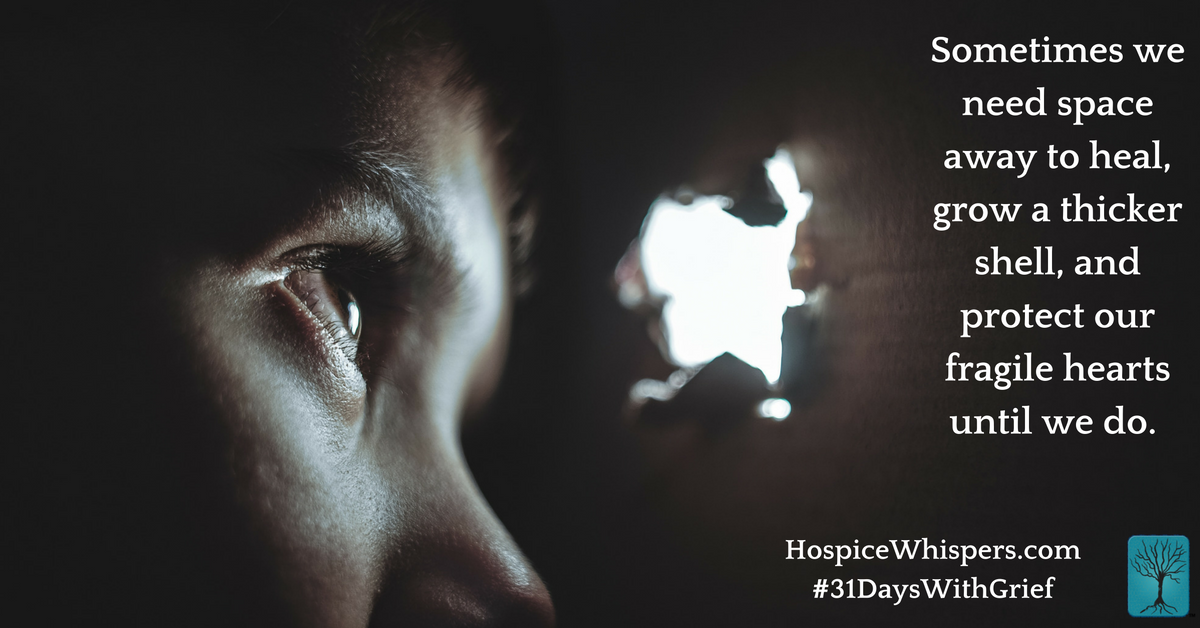31 Days of Walking with Grief: Others’ and Our Own
Day 7—The Need to Withdraw
This is a month-long series to support persons grieving and those who love them. It includes content from “Sharing Our Stories: A Hospice Whispers Grief Support Workbook” available through Amazon and wherever books are sold.
One across-the-board warning sign that someone is not in a good emotional or spiritual place is when they begin to isolate themselves from others. Cutting oneself off from the support and accountability of community can be indicative of shame, fear, avoidance, and can lead us to lose perspective on the world as we ruminate on our own thoughts without the balance of others’ views.
In this place, we can forget to remember the whole story—we get stuck focusing on the negatives to the exclusion of the love and beauty and care and gifts that still surround us, even when life otherwise feels truly sucky. As many have said, the mind can be a dangerous neighborhood to walk in alone when it gets dark.
But I’ve learned that there’s a difference between isolating, which is hiding away from and avoiding life, and taking time away to care for our weary souls and fragile emotions. Whether we call the latter cocooning, nesting, or recharging, sometimes for the sake of balance we need times away; a break from all the external stimulation, distractions, requirements, and any form of expectations others may have on our time and energy.
As a raging extrovert who has learned to practice regular contemplation, meditation, and silent retreats, I’ve learned the gifts that can be found in such times. I’ve even come to, believe it or not, crave silence and solitude. It takes energy to be “on” and engaged. We can only drive for so long before we must refuel. No matter how good or healthy or strong we are, we’re also human.
When we’re wounded, mourning, processing trauma, seeking meaning in the seemingly meaningless, it can be that much more important that we a) avoid isolating in our grief and b) take time away to care for ourselves. It’s a careful balance we must strike. Here’s how I tell the difference;
If I find myself dodging the people closest to me because I don’t want them to know what’s really going on with me, I’m isolating, and not in a good way.
If I find myself ruminating on and nursing my resentments against and anger with others, refusing to consider the possibility I’ve played a part in a situation, I’m isolating and perpetuating my suffering.
BUT…
If I’m emotionally exhausted and simply don’t have it to give to be around others, make small talk, and pretend to be ok, I’m doing good self-care to take quiet time to renew and recharge.
I once heard a rabbi tell a story of the life cycle of lobsters; when they outgrow their shell, it becomes uncomfortable to be inside it anymore. So, they cast it off and go hide under a rock for protection, since they’re now completely exposed and defenseless. They stay there until they’ve formed a new and larger shell that can hold their growing body comfortably.
Grief can consume our emotional and mental, and therefore physical, energy and resources; it can give us much thinner skin. We can walk around feeling exposed like a nerve or raw like an open wound.
I’ve come to learn that sometimes when I begin to chide myself for “isolating” what I’m actually doing is taking time to rest under the protective shelter of a rock until my outer shell, stripped away by the struggles of life, has regrown. That’s not hiding or avoiding or isolating or anything pejorative; that’s wise, natural, and healthy self-protection.
So if you, or others, are pushing yourself to get out and about and engage, get still and quiet and listen to your own inner wisdom—are you hiding, avoiding, or isolating in a detrimental way or are you nesting, cocooning, lobster-ing away temporarily until you have what you need to safely re-emerge?
Trust yourself. Don’t let anyone rush you or, even worse, coerce and shame you into going against what you really need. Except in extreme cases of clinical depression or complicated grief, which I’ll discuss later in this series, when we are ready we will naturally emerge like the chick from the egg, the child from the womb, the butterfly from the cocoon, and the lobster from the rock.
After all, there is life out there calling to us to return and not follow the one we love to the grave, forever. In time, we’ll hear its song and re-emerge. Until then, may you find comfort in knowing that others across the world join you there and, ironically, you are not alone.
Peace,
Carla
 Rev. Carla Cheatham, MA, MDiv, PhD, TRT has served hospices as a chaplain and bereavement coordinator. She’s the Section Leader for the Spiritual Caregivers Section of the National Hospice and Palliative Care Organization and an adjunct professor at the Seminary of the Southwest. Through her Carla Cheatham Consulting Group, Carla provides training and consulting for professional caregivers nationwide. She is the author of Hospice Whispers: Stories of Life and its companion volume, Sharing Our Stories: A Hospice Whispers Grief Support Workbook. Her next book, On Showing Up with Suffering: Others’ and Our Own, is set to publish in 2017.
Rev. Carla Cheatham, MA, MDiv, PhD, TRT has served hospices as a chaplain and bereavement coordinator. She’s the Section Leader for the Spiritual Caregivers Section of the National Hospice and Palliative Care Organization and an adjunct professor at the Seminary of the Southwest. Through her Carla Cheatham Consulting Group, Carla provides training and consulting for professional caregivers nationwide. She is the author of Hospice Whispers: Stories of Life and its companion volume, Sharing Our Stories: A Hospice Whispers Grief Support Workbook. Her next book, On Showing Up with Suffering: Others’ and Our Own, is set to publish in 2017.



Leave a Reply